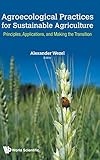Agroecological practices for sustainable agriculture: principles, applications, and making the transition / edited by Alexander Wezel
Wezel, Alexander [editor].
Tipo de material: Libro
impreso(a)
Editor: New Jersey: World Scientific Publishing Europe Ltd., c2017Descripción: xv, 485 páginas : ilustraciones, mapas ; 24 centímetros.ISBN: 1786343053; 9781786343055.Tema(s): Agricultura sostenible
Libro
impreso(a)
Editor: New Jersey: World Scientific Publishing Europe Ltd., c2017Descripción: xv, 485 páginas : ilustraciones, mapas ; 24 centímetros.ISBN: 1786343053; 9781786343055.Tema(s): Agricultura sostenible| Tipo de ítem | Biblioteca actual | Colección | Signatura | Estado | Fecha de vencimiento | Código de barras |
|---|---|---|---|---|---|---|
| Libros |
Biblioteca Tapachula
Texto colocado en la configuración de la biblioteca Tapachula |
Acervo General | 630.2745 A31 | Disponible | ECO020013742 |
Incluye bibliografía e índice: páginas 481-485
Preface Chapter 1 Agroecological Principles for the Conversion of Farming Systems.. Chapter 2 Agroecology and Agroecological Cropping Practices.. Chapter 3 Applying Agroecological Principles for Regenerating Soils.. Chapter 4 Transitions to Agroecological Nutrient Management Practices in the USA Corn Belt.. Chapter 5 A Disturbance-Based Framework for Understanding Weed Community Assembly in Agroecosystems: Challenges and Opportunities for Agroecological Weed Management.. Chapter 6 Integration of Genetically Modified Crop Traits in Agroecological Practices in Europe: A Critical Review.. Chapter 7 Entomovectoring: An Agroecological Practice of Using Bees for Biocontrol.. Chapter 8 Agroecology and Participatory Knowledge Production and Exchange as a Basis for Food System Change: The Case of the Community Agroecology Network.. Chapter 9 Assessing the Impact of Management Interventions in Agroecological and Conventional Cropping Systems Using Indicators of Sustainability.. Chapter 10 A Framework for the Design of Agroecological Livestock Farming Systems.. Chapter 11 Agroecological Principles and Practices for Grass-Based Farming Systems.. Chapter 12 Agroecological Management in Fish Pond Systems.. Chapter 13 Education in Agroecological Learning: Holistic Context for Learning Farming and Food Systems.. Chapter 14 Teaching Agroecological Practices to Higher Education Students, Farmers, and Other Stakeholders: Examples from France.. Chapter 15 Learning Agroecological Practices as Components of Complex Farming Systems.. Chapter 16 Agroecological Practices: Potentials and Policies.. Index
Good agroecological practices are indispensable for the development of sustainable agriculture. In this book, principles, diversity and applications of agroecological practices for a range of systems are presented, transforming scientific research and participatory knowledge of production into practical application. It illustrates a broad range of research and teaching being used within the farming community to demonstrate best practice and current state-of-play within the field. Agroecological methods used in crop farming, grass-based livestock farming, fish production, and other complex farming systems are discussed. Conclusions are drawn from studies to provide an outlook on future trends of agroecological practices and on policies supporting implementation. Due to emphasis on real-life application, it is relevant not only to students of the agricultural sciences and public policy, but also to researchers, stakeholders and policy makers involved in the development of sustainable agriculture. eng
